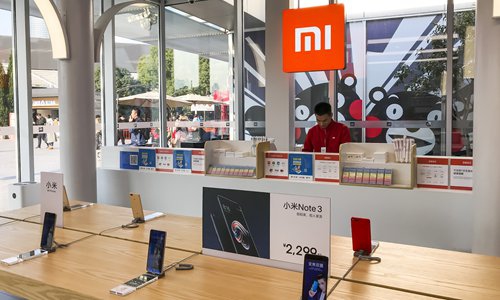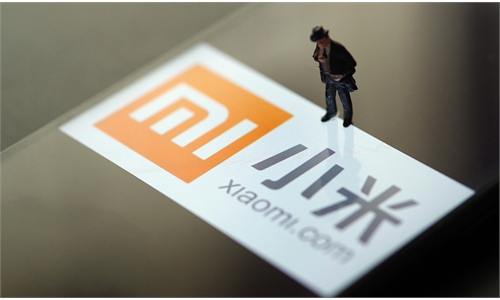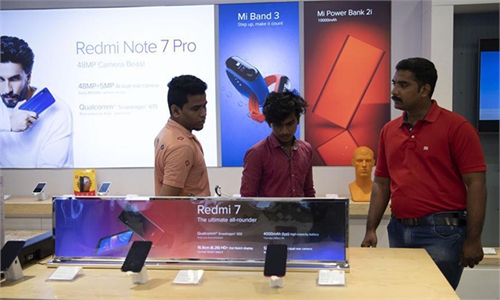
A Chinese employee at Xiaomi's Mi Home in Shanghai Photo: IC
Chinese mobile phone companies are becoming shareholders of domestic chipmakers to secure semiconductors at a time when China-US political friction makes US supplies very unreliable for Chinese phone vendors.In one recent example, Xiaomi and Oppo became shareholders of Jiangsu Changjing Electronics Technology Co, a semiconductor maker based in East China's Jiangsu Province, according to China's company information website qcc.com.
It's unclear how large the stakes are, but the qcc.com data showed that Jiangsu Changjing's registered capital surged by 12.67 percent to 357 million yuan ($55.3 million) after Xiaomi, Oppo and seven other companies became shareholders.
Xiaomi and Oppo are both clients of Jiangsu Changjing, whose other clients include Semiconductor Manufacturing International Corp and electrical appliance company Haier.
The investment has led to market speculation that Xiaomi wants to resume making chips. Xiaomi launched an independently researched chip in 2017, but didn't make any further progress.
Xiang Ligang, an independent telecom analyst, interpreted the investment more as a move by domestic phonemakers to secure their supply chains rather than a signal that they will invest on a large scale in the chip sector.
Chinese mobile phone producers have come to realization that they can't rely on overseas suppliers, particularly US companies, after Huawei was taken by surprise by the US government's restrictions on US companies' supplies to the company, experts said.
"Xiaomi's and Oppo's investments in chip companies can not only secure chip supplies for them, but also enhance the quality of chip products by supporting upstream companies' research and development," Xiang told the Global Times.
Telecom analyst Fu Liang said that the investments may also reflect some changes in mobile phone companies' strategy, in that they won't restrict their business to making phones in the future.
This is particularly so for Oppo which, unlike Xiaomi, seldom made investments in upstream companies in the past. "This means that Oppo is searching for new directions to develop a complete product line containing a series of smart devices, instead of just focusing on mobile phone production," he told the Global Times.
Both experts said that such investments would bring great benefits to China's chip industry, which would have developed faster with more investment capital.
"I think that inflows of capital, particularly long-term, strategic capital like those from industry players [such as Xiaomi] would speed up Chinese chipmakers' process of filling technology gaps with the US and other countries," Xiang told the Global Times.
Fu said that closer ties between terminal phone sellers and chipmakers could enhance the "efficiency" of chip research, as mobile phone companies will steer the direction of such research according to market needs.
However, he cautioned that if each country resorts to developing a complete mobile phonemaking chain by itself, it would signal splits in the global industry chain, which would harm the industry in general in the long run.



